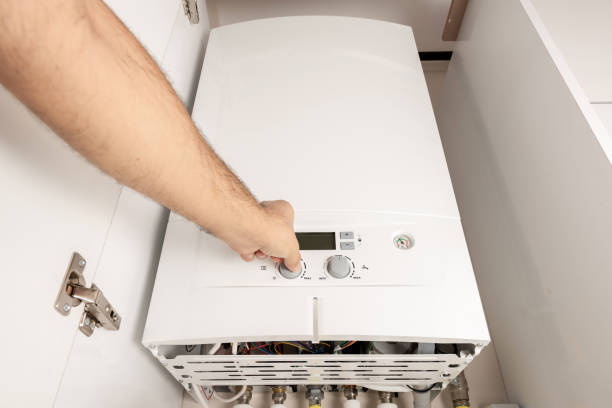As the temperature continues to fall as autumn fades into winter, it is essential to make sure your heating system is prepared for winter.
Usually this involves simple steps you as an individual can take, such as safely bleeding radiators, checking and adding water pressure to keep it within its safe operating limits, and checking to ensure nothing is wrong with the flue or the pipework in less insulated parts of your home.
The most important action you should take is to get your boiler inspected and serviced if you have not already this year, as prevention is far better than cure.
It is important to act quickly if a boiler breaks down, as a broken boiler could potentially cause damage to your house through leaking pipes or even a serious safety risk due to carbon monoxide or gas leaks.
Because a gas leak is an emergency that puts a plurality of people at risk, time is of the essence as soon as you notice one.
Getting in touch with an emergency gas engineer is vital for saving lives and protecting your property, but the dangers of a broken boiler are multifaceted, and the responsibilities of a landlord or building manager especially can not only be ethical but also legal.
To understand this, it is important to know not only your legal responsibilities but also why a broken boiler can be dangerous for more reasons than the obvious.
What Are The Legal Requirements For Landlords?
A landlord is obliged to keep the building in proper working order, with Section 11 of the Landlord and Tenant Act 1985 noting specifically that the water, gas and electricity supply need to be kept in “proper working order”, as well as installed components used for heating water and space alike.
The wording is broad, but clearly includes boilers and radiators, and could also describe other forms of heating systems such as heat pumps and underfloor pipes.
Whilst the law does not specify an exact timescale, there is a firmly established precedent that boilers should be repaired within 24 hours, with replacement equipment provided if that is not possible.
Outside of freak weather events that can affect the ability of a boiler engineer to respond to callouts and increase the demand for boiler repairs, most boiler firms will be able to provide emergency repairs.
Tenants can sometimes be entitled to compensation if boiler disrepair is part of the tenancy agreement or if a landlord takes too long to adequately respond, so it is important on a legal basis to act quickly. Landlords who continue to renege on their responsibilities can quickly end up in trouble.
Thankfully, most landlords have provisions in place for exactly this.
Why Does A Boiler Need To Be Repaired Quickly?
We explored a few examples of when boiler repairs need to be undertaken immediately and where the safety of inhabitants and people who live nearby is put in imminent jeopardy.
However, even if a boiler breaks without leaking or creating a hazard, it can still become a safety issue.
Many older homes in the UK are very badly insulated, in part because they were designed to let in a lot of heat in an era of smoky fireplaces.
This means that they are not only uncomfortably hot in summer, but they can get especially cold in winter.
Cold weather can cause a huge number of problems for your house and the people within it, and a lengthy period without a boiler can sometimes require extensive and expensive repairs.
From a boiler perspective, if it is not running for a while, some other components and parts may seize up, which can turn a relatively simple repair job into a much more involved procedure. At worst, it may cause a boiler to become too expensive to repair and necessitate a replacement.
Alongside this, a non-functioning boiler in frozen or near-frozen conditions can cause ice to block and cause damage to your pipework. As water expands when it freezes, unlike any other liquid, it can cause cracks in your pipework, creating leaks that can be expensive to fix and cause potentially significant damage to your property.
Finally, a broken boiler and the freezing conditions it creates can cause dangerous conditions such as damp and mould to form, fester and grow, which can cause chronic respiratory conditions if left for long enough and be remarkably difficult to remove.
This is also becoming a legal responsibility for landlords in the wake of Awaab’s Law, part of the Renters’ Rights Bill.

